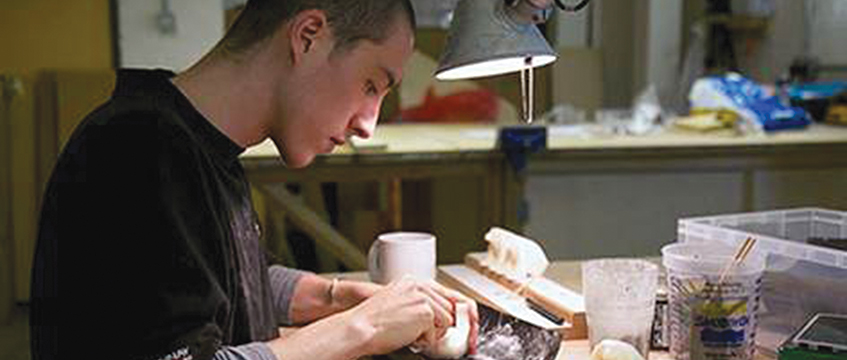Last year was the year of WeWork – a flexible office operator that became synonymous with co-working despite accounting for only a sliver of the global market.
Much of the industry is made up of small operations catering to very specific groups, thriving and finding value in being niche.
While WeWork has more space than any other operator in London, it is only the sixth largest by number of centres, accounting for just 2% of all co-working locations in the capital, according to data from the Instant Group.
Here, EG looks into three flexible workspaces that help make up the alternative 98% and how they have found ways to tackle specific demands in a city as diverse as London.
We Heart Mondays
For… women

The walls of Swan Wharf, a Victorian warehouse in Hackney Wick, E9, are covered in elaborate graffiti.
Outside, cranes loom over a harsh jumble of scaffolding. But once you have gone through a side door and up a narrow flight of steps desperate for a lick of paint, a bright co-working space welcomes its all-female members.
When Layla Rivelino and Andre Sinclair launched We Heart Mondays in November last year, they created a space to nurture professional and social connections among younger women in creative industries.
Rivelino says: “There is a lot of comfort for the women who come here because having a female-only space eliminates certain issues that could come into play within a co-ed working space.
“It enables them to network with each other and make friendships as well, which can be a bit difficult when you have left the school and college environments.”
Men are not banned from the space. If someone has hired a male photographer or is working on a project with a man, they are welcome but membership and desks are exclusively for women.
However, avoiding problems ranging from harassment to exclusion is not the only reason Rivelino created We Heart Mondays.
“It is important in business in general to be as niche as you can,” she says. “It tends to get better results because you can cater better to the people you are providing the service for.”
For We Heart Mondays that includes hosting events that range from leadership and mentoring workshops to film nights and complimentary beauty treatments.
A goal and content planning workshop takes place on the last Monday of every month, where members help each other plan their next steps in whatever business they might be involved in.
A community manager who doubles as a mental wellbeing coach is also available.
Already, the space has 50 members, about 10 of whom are “flexi” customers with access to the space three days a week, while the rest have the “luxe” package.
Those members get access six days a week and have the option to use a private meeting room. They can also hire the space for their own events with a 50% discount.
In total, the space can accommodate just 100 members, which is why Rivelino and Sinclair are searching for their next space. South London is Rivelino’s next target, hopefully around Clapham, SW4, though she says they are looking for any area with a creative presence.
“We have had a lot of demand from people who can’t necessarily make it to Hackney Wick. The demand is there already,” she says. “As soon as we find something that’s suitable for what we need, we will be there.”Flexi
Membership
Flexi
- £29.99 per month
- Access three days a week
Luxe
- £69.99 per month
- Access six days a week
- Private meeting room
- Discount on venue hire
USP
- Content and goal-planning workshops
- Social events
- Health and wellbeing advice
Makerversity
For… product designers

It can be lonely running a start-up. That is one of the reasons Makerversity exists.
In the basement of Somerset House, WC2, there is a co-working space that combines wood, engineering, textiles and digital workshops with traditional office space.
Some 250 members across 80 businesses come together in order to build anything from hats and machines to websites.
Esther Ellard, community manager at Makerversity, says: “We exist to support start-up maker businesses, to bring making back into the centre of the city and to inspire the next generation of makers.”
Rising costs in London have priced out a lot of creatives, which is why affordability is key for the team.
Somerset House offered discounts for the space in return for Makerversity renovating the basement when it started in 2013, which means members’ prices are kept lower than they otherwise would be.
But it’s more than just affordability. “A huge part of why people join and stick around is the ability to share problems and solutions,” Ellard adds.
“Maybe you need someone to help you with a project, and someone with those skills is probably already there. You can test the waters a lot more because of the community that’s based here.”
Like other niche co-working spaces, the goal is to help a community expand, to share experiences and fill gaps in each others’ understanding.
Makerversity hosts practical events for members, including talks from lawyers and consultants, while also running teaching programmes for schools and youth charities that its members can contribute to.
“Lots of people don’t realise that starting their own business is an option,” says Ellard. “It is about demystifying that a little bit.”
In some ways, the hope is that Makerversity members will eventually move on.
“We exist to support start-up businesses, so there comes a point where hopefully people’s businesses are doing so well that they graduate from us,” says Ellard.
Over the years, Makerversity has grown a network of these alumni, however, they often come back to work on a new project or to recruit new talent if they are expanding their businesses.
As the community expands in London, Makerversity is also looking at ways to expand. It opened a second location in Amsterdam last year with about 90 members.
Where to go from there? Ellard is still not sure, but for her and her team, there is a whole world of makers who want a network and a community.
Membership
Full-time membership
- £325 per month
- Permanent desk, 24-hour access
- Roaming membership
- £200 per month
- Hot desk space, 60 hours access per month
USP
- Access to workshops and office space
- Professional advice
- Volunteering and teaching opportunities
- Social events
- Health and wellbeing advice
Rise
For… Fintech

Barclays has set itself up as a fintech incubator in Shoreditch, creating networks between ambitious start-ups and helping them grow.
That all happens at Rise, a seven-storey flexible workspace with 500 members across 45 companies.
“We are a platform for networks that are relevant to your fintech business,” explains Magdalena Krön, head of Rise London and vice president of Open Innovation at Barclays.
The bank set up the space – one of six across the globe – last May as a way of connecting with those at the cutting edge of finance.
She says: “There are so many places where we are, I wouldn’t say far behind, but technology has the ability to move so much faster than we do. The financial industries are struggling a lot with legacy systems.”
Part of Krön’s job is to sit down with the companies in the building, figure out where they are in their development and pinpoint how they can either work with Barclays or get the support they need from other experts in the Rise global network.
The benefit for the start-ups is having access to a large corporate – a “big beast” that can feel impossible to access otherwise, says Krön – and making use of the partnerships at their fingertips.
Regular events are held in a basement auditorium. “The founders of all companies can come in and they know that every night there is an event they can go to and they can check who’s attending and scout talent by networking,” says Krön.
“They don’t have to run around the whole of London to find the appropriate events.”
She adds that although Barclays facilitates the building and runs a three-month accelerator programme for some of the most promising start-ups in the space, companies are not obligated to work with the bank or restricted from working with other banks.
The building is littered with sofas and meeting areas on each floor, alongside a central café, but most of the space is divided into private offices.
Fintech companies, regulated by the Financial Conduct Authority, need to protect their clients’ data, which makes open space counterintuitive. They need an office store they can lock.
However, there is flexibility. The size of the building allows start-ups to expand, with the option of knocking down walls to grow individual offices.
Rise also has a podcast studio and in the basement there are showers and bike storage – “The hipster Shoreditch things you need to have”, Krön laughs, adding that there are no microbreweries – yet.
Rise filled its space in less than six months and since it is “bursting at the seams”, Krön says it has been forced to say no to new start-ups.
“Considering there is a really competitive market in London around co-working, especially with WeWork opening everywhere, we can see the value of having a niche proposition,” she says.
Membership
Resident
- £499 per month
- Dedicated desk, two meeting room credits per week, private locker
Office
- £650 per month
- Private, personalised office; promotion on the Rise network
USP
- Access to fintech network
- Mentorship
- Direct contact with Barclays
From last resort to setting a trend
Dan Bayley, head of city leasing, BNP Paribas Real Estate
Where letting space to a serviced office operator was once seen as a last resort, it is clear that serviced offices can provide an amenity to existing tenants within the building.
Indeed many occupiers see co-working or serviced office space as important as good retail and leisure provisions on the ground floor.
Many traditional landlords have begun to respond, launching their own brand or funding existing offerings, such as at British Land’s 4 Kingdom Street, W2, and 2 Finsbury Avenue, EC2, where its Storey brand has already seen significant letting success.
In such situations, landlords have greater control over the serviced offices and are able to use the space as an incubator, to attract growing tenants to their portfolio and to graduate them on to a more traditional lease once their business is established.
At the crux of the growth in popularity of serviced offices is tenants’ desire for greater flexibility.
Serviced offices are a good choice for landlords wishing to embrace this trend, but many are also adopting a “space as a service” ethos.
At 22 Bishopsgate, EC2, for example, AXA is looking at creating a floor of collaborative meeting spaces to provide a service to occupiers who may not otherwise be able to afford the extra desks.
The flexible trend is not exclusive to London. In Paris, co-working has seen similar growth, with volumes rising by 70% from 2016 to 2017.
The push into other European cities and UK regions will develop and we are already witnessing some of the leading operators beginning to expand.










